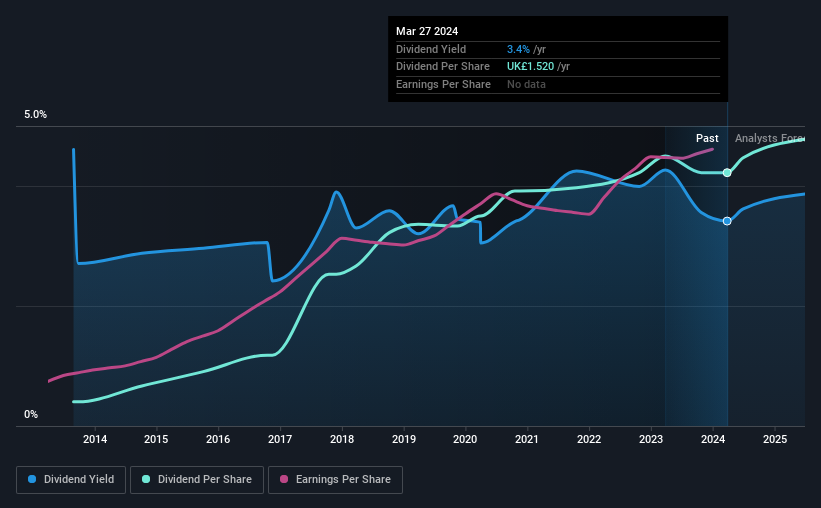Bioventix's (LON:BVXP) Dividend Will Be £0.68
The board of Bioventix PLC (LON:BVXP) has announced that it will pay a dividend of £0.68 per share on the 26th of April. This will take the annual payment to 3.4% of the stock price, which is above what most companies in the industry pay.
Check out our latest analysis for Bioventix
Bioventix Is Paying Out More Than It Is Earning
We like to see robust dividend yields, but that doesn't matter if the payment isn't sustainable. Prior to this announcement, the company was paying out 95% of what it was earning. Without profits and cash flows increasing, it would be difficult for the company to continue paying the dividend at this level.
Over the next year, EPS is forecast to expand by 5.1%. Assuming the dividend continues along recent trends, we think the payout ratio could reach 107%, which probably can't continue without putting some pressure on the balance sheet.
Bioventix Has A Solid Track Record
The company has been paying a dividend for a long time, and it has been quite stable which gives us confidence in the future dividend potential. The annual payment during the last 10 years was £0.145 in 2014, and the most recent fiscal year payment was £1.52. This means that it has been growing its distributions at 26% per annum over that time. So, dividends have been growing pretty quickly, and even more impressively, they haven't experienced any notable falls during this period.
Dividend Growth May Be Hard To Achieve
The company's investors will be pleased to have been receiving dividend income for some time. Bioventix has seen EPS rising for the last five years, at 8.9% per annum. While EPS is growing at a decent rate, but future growth could be limited by the amount of earnings being paid out to shareholders.
The Dividend Could Prove To Be Unreliable
Overall, we always like to see the dividend being raised, but we don't think Bioventix will make a great income stock. We can't deny that the payments have been very stable, but we are a little bit worried about the very high payout ratio. We don't think Bioventix is a great stock to add to your portfolio if income is your focus.
It's important to note that companies having a consistent dividend policy will generate greater investor confidence than those having an erratic one. At the same time, there are other factors our readers should be conscious of before pouring capital into a stock. For example, we've picked out 1 warning sign for Bioventix that investors should know about before committing capital to this stock. If you are a dividend investor, you might also want to look at our curated list of high yield dividend stocks.
Have feedback on this article? Concerned about the content? Get in touch with us directly. Alternatively, email editorial-team (at) simplywallst.com.
This article by Simply Wall St is general in nature. We provide commentary based on historical data and analyst forecasts only using an unbiased methodology and our articles are not intended to be financial advice. It does not constitute a recommendation to buy or sell any stock, and does not take account of your objectives, or your financial situation. We aim to bring you long-term focused analysis driven by fundamental data. Note that our analysis may not factor in the latest price-sensitive company announcements or qualitative material. Simply Wall St has no position in any stocks mentioned.

 Yahoo Finance
Yahoo Finance 
